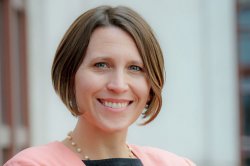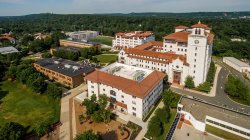Emily Hodge
Assistant Professor, Educational Leadership
Posted in: Spotlights, Teacher Education Spotlights

What was your college experience like?
I went from a high school where I had a lot of academic success to a selective university where I felt like everyone knew more than me. I had a lot to learn about writing and study skills. (I was exempt from freshman composition because of my SAT score, but I think I needed the class!) I also didn’t understand that different disciplines have different modes of writing, and I was confused about why I wasn’t getting better grades on my history papers, for example, by using a lot of quotes as I did in my papers for English class. I was embarrassed to seek help from my professors because I didn’t want to admit that I needed it. It wasn’t just writing that I needed help with, but reading too. I either skimmed readings or read them too deeply, pouring over every word, rather than reading for the main points. Despite feeling unprepared at times, I loved getting to explore a variety of subjects, taking classes like a history course on the civil rights movement (from Julian Bond!), an astronomy class exploring the possibility of life beyond the earth, and an anthropology course with a postcolonial lens focused on understanding how other parts of the world view the West and why. I also loved playing the flute in virtually every ensemble offered.
Did you go to college with the intention of being a professor? If not, how did your path bring you here?
I thought that I wanted to be a teacher, not a professor. At first, I wanted to be a teacher because school was a place where I felt successful, and I thought it was a career where I could help others. My teacher preparation at the Curry School of Education at UVA was life-changing, however. I grew to see teaching as a role in which I could help affect positive social change and a more just society through helping students understand the deeply embedded structures of inequality in our society as they read, wrote, spoke, and listened—the study of English language arts was, in fact, the study of the world.
At the time, I thought I would be a secondary English teacher for my entire career. However, in hindsight, it was probably clear that studying curriculum in some other role was in my future. I was already fascinated in college with debates over what people “should” learn in school and how they should learn it, and the extent to which school should promote unquestioning patriotism or a more critical view of the United States. In my English education course, I created an instructional unit where the essential question was, “What is the purpose of school?” Similarly, the culminating project for my Master’s in English was a rationale and outline for a more diverse American literature curriculum. I went to graduate school because I wanted to keep learning about these issues—I had no idea if I wanted to try to be a college professor or not (though now, I can’t imagine a career that would be a better fit for me in terms of still getting to teach, but also pursuing answers to my own questions about education policies and practices.)
What is one thing you wish you had known in your undergraduate/graduate career? Why?
I wish I had come to understand earlier in my life the importance of setting small, measurable goals each day. The fear of getting started and producing something that can be judged, whether it’s writing or something else, can be so overwhelming that it can be hard to take the first step. I finally learned how important it is to let go of that inner critic and accept that writing a bad paragraph is an important first step, just like taking any small action step is better than no step at all.
What is the best part about being an MSU faculty member?
I love the incredible diversity of our student body and the chance to work with smart, passionate educators who want to improve their schools. I love being in a college environment where there are so many lectures and performances. I am fortunate to have wonderful coworkers who make coming to work a pleasure. I love the variety of work that comes with this job—that I get to move from creating a syllabus on education policy for PhD students to thinking through data interpretation for school improvement with Master’s students, to meeting with colleagues to work on research projects or improving our programs. I love that I get to play a role in leading people to question their assumptions about why school is the way it is and how it might be different— more humane, individualized, and just.
What does a typical day look like for you?
In a typical day, I try to do something that moves my research forward every day in the morning before I go to campus or otherwise get distracted by meetings, emails, administrative tasks, course preparation, teaching, grading, etc. If I am on campus, I am usually socializing with my colleagues, teaching, or in meetings with students or for various service responsibilities. If I am working from home, I try to do my most important work by 2 PM. At 2 PM precisely, my dog makes it known that she would like her afternoon walk, and I can do smaller tasks after that, but I have a hard time working on anything that requires sustained focus after that point.
What are a few of your recent accomplishments?
I was really proud that I had a piece from my dissertation published in the American Educational Research Journal last year. It took six years to go from data collection to publication, and this journal is just about the best possible place in the field of education where you could publish your work. I was also proud when my post-dissertation project was written about in Education Week. Finally, I have been invited to video conference into a few graduate classes at other universities because my article is on the syllabus. I will never get tired of the idea that my scholarly work has been assigned in a course, and I will always accept a guest lecture request!
What is your favorite class to teach at MSU? Why?
I really enjoy teaching ELAD 635, “Curriculum, Instruction, and Assessment,” because it’s a chance for students to think through how to facilitate meaningful professional learning experiences for teachers in their schools. It’s also the class that is most close to my research, and I enjoy bringing in what I have learned about standards, curriculum, and instructional resources where it’s relevant.
What advice would you give to incoming students in order for them to succeed?
Don’t be afraid to reach out to your professor for help, or even to give them a little nudge if they don’t get back to you after a day or two (sometimes life gets hectic!)
